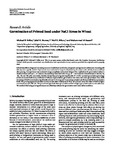Germination of primed seed under NaCl stress in wheat.
| dc.contributor.author | Fuller, MP | |
| dc.contributor.author | Hamza, JH | |
| dc.contributor.author | Rihan, HZ | |
| dc.contributor.author | Al Issawi, M | |
| dc.date.accessioned | 2013-01-28T13:57:41Z | |
| dc.date.accessioned | 2013-01-28T13:57:55Z | |
| dc.date.available | 2013-01-28T13:57:41Z | |
| dc.date.available | 2013-01-28T13:57:55Z | |
| dc.date.issued | 2012-12-01 | |
| dc.identifier.issn | 2090-8598 | |
| dc.identifier.issn | 2090-8598 | |
| dc.identifier.uri | http://hdl.handle.net/10026.1/1262 | |
| dc.description.abstract |
Copyright © 2012 Michael P. Fuller et al. This is an open access article distributed under the Creative Commons Attribution License, which permits unrestricted use, distribution, and reproduction in any medium, provided the original work is properly cited. Soil salinity affects a large and increasing amount of arable land worldwide, and genetic and agronomic solutions to increasing salt tolerance are urgently needed. Experiments were conducted to improve wheat seed performance under salinity stress conditions after priming. An experiment was conducted using a completely randomized design of four replications for germination indices in wheat (Triticum aestivum L. cv. Caxton). Normal and primed seed with PEG6000 at −1MPa and five concentrations of NaCl (0, 50, 100, 150, and 200mM) were tested. Results indicate that priming seed significantly (P < 0.05) increased germination percentage at first count and final count, coefficient of velocity of germination, germination rate index, and mean germination time, while increasing of NaCl concentration significantly reduced it. Priming seed improved germination attributes at all NaCl concentration levels. The priming appeared to be able to overcome the effect of salt stress at 50 to 100mMand reduce the effect of NaCl at higher concentrations up to 200 mM. The primed seed gave both faster germination and led to higher germination when under salt stress. We conclude that using priming techniques can effectively enhance the germination seed under saline condition. | |
| dc.format.extent | 1-5 | |
| dc.language | en | |
| dc.language.iso | en | |
| dc.publisher | Hindawi Limited | |
| dc.relation.replaces | http://hdl.handle.net/10026.1/1261 | |
| dc.relation.replaces | 10026.1/1261 | |
| dc.subject | 3001 Agricultural Biotechnology | |
| dc.subject | 30 Agricultural, Veterinary and Food Sciences | |
| dc.subject | 3004 Crop and Pasture Production | |
| dc.subject | Cardiovascular | |
| dc.title | Germination of primed seed under NaCl stress in wheat. | |
| dc.type | journal-article | |
| dc.type | Article | |
| plymouth.volume | 2012 | |
| plymouth.publication-status | Published | |
| plymouth.journal | ISRN Journal of Botany | |
| dc.identifier.doi | 10.5402/2012/167804 | |
| plymouth.organisational-group | /Plymouth | |
| plymouth.organisational-group | /Plymouth/Faculty of Science and Engineering | |
| plymouth.organisational-group | /Plymouth/Faculty of Science and Engineering/School of Biological and Marine Sciences | |
| plymouth.organisational-group | /Plymouth/REF 2021 Researchers by UoA | |
| plymouth.organisational-group | /Plymouth/REF 2021 Researchers by UoA/UoA06 Agriculture, Veterinary and Food Science | |
| plymouth.organisational-group | /Plymouth/Users by role | |
| plymouth.organisational-group | /Plymouth/Users by role/Academics | |
| dc.identifier.eissn | 2090-8598 | |
| dc.rights.embargoperiod | Not known | |
| rioxxterms.versionofrecord | 10.5402/2012/167804 | |
| rioxxterms.licenseref.uri | http://www.rioxx.net/licenses/all-rights-reserved | |
| rioxxterms.type | Journal Article/Review |


